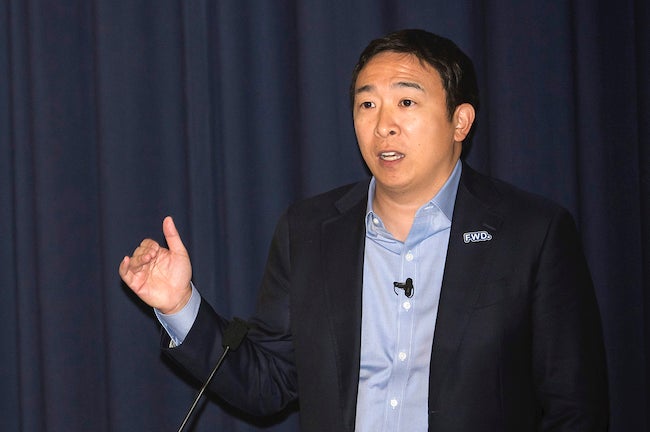Former presidential and New York mayoral candidate Andrew Yang took the stage as the featured speaker in the Rice University's President's Lecture Series March 28, talking about his experience running for the highest office in the land and how he hopes to fix American democracy.
Rice President David Leebron, who counted Yang among his torts students when he on the faculty at Columbia Law School, introduced his former pupil before a packed house in McNair Hall's Shell Auditorium.

"This is the first actual in-person presidential lecture we've had since February 2020," he said, prompting thunderous applause before welcoming Yang to the podium.
"It's tremendous to be here with you all," Yang said. "This is an amazing institution, a great leader and let's applaud President Leebron in his final year in office," he said, prompting more cheers.
Over the course of his presentation, Yang discussed his life, career and foray into politics. He remembers making a list of life goals when he was young, but running for president was never on it, he said.
Before announcing his candidacy to be the Democratic nominee for president in 2020, Yang worked a short stint in corporate law, got involved with various start-up ventures and eventually became CEO at a successful education company. He also started Venture for America, an organization focused on finding and training entrepreneurs to start businesses in economically stressed cities.
Only after becoming part of the nonprofit world and traveling the country as part of those efforts did he start thinking about some of America’s bigger problems. Then came former President Donald Trump’s election in 2016, a byproduct of those problems who he described as a "giant red flag."
"I thought that this was a sign that it was slipping away, that the (economic) transitions that I'd seen in the Midwest and the South were not being properly acknowledged," he said, referring to the financial hardships caused by the loss of millions of manufacturing jobs.
Yang said he couldn’t think of a way to solve the nation’s problems without taking the reins of the federal government.
"As a serial entrepreneur, I boiled down my success to just one factor," he said. "There's a lot of noise, a lot of commotion around these presidential primaries, there was only one factor that would determine whether or not I became president or not. And that was whether I can get 40,000 Iowans on board with abolishing poverty."

Over the next three years, Yang's campaign raised millions of dollars and outlasted many career politicians before falling short of the nomination. After his run ended, he campaigned for President Joe Biden, went to Georgia to help Democrats win Senate seats, and set about researching a book to figure out why it seemed like the U.S. system had gone awry.
"Even though I had accomplished unlikely things as a presidential candidate, I still feared that things were getting worse, not better," he said. Many of you might feel that way about our country."
Yang lamented that politicians’ incentives often shift over time from acting in the public's best interest to toeing the party line.
"The truth is that, at this point, most of us have no say in our elected government," he said.
Yang said moving away from a two-party system and changing how we vote could be the solution to many problems.
After his presidential run, he formed the Humanity Forward Foundation, a nonprofit dedicated to promoting the ideas he campaigned on, including universal basic income , ranked choice voting and enhanced data privacy. In 2021, he left the Democratic party, declared himself an independent and wrote " Forward: Notes on the Future of Our Democracy ," in which he announced his plans to found a new third party, the Forward Party.
"What we need is a systems change to ranked choice voting combined with nonpartisan open primaries," Yang said. "These are the pro-moderation mechanics that would actually reverse the incentives (to vote a certain way) that so many of us have seen and are concerned about."
Yang noted that Alaska successfully launched a ballot initiative in 2020 to switch to ranked choice voting, and that he’s now partnering with likeminded people to make ranked choice voting and open primaries a reality in other states.
"When you see a massive problem that affects all of Western civilization, in my mind, you have to do something about it," he said. "That's something that my parents taught me. I hope it's something that your parents taught you, and I hope it's something you learn here at Rice."
Rice University's President’s Lecture Series was created to enrich the intellectual life of the Houston community by bringing to the Rice campus "celebrities of substance," speakers of both high intellectual distinction and broad public appeal. The President's Lecture Series Committee welcomes nominations for possible future speakers. For more information, visit https://president.rice.edu/pls .

